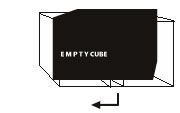MAURO CERQUEIRA
SEPTEMBER, 30, 2009 GALERY IPTOMAR

CONTACTS
maurocerqueira.blogspot.com
EXHIBITION INFORMATION
LIKE STEPS ON A FLOOR HOLLOED FROM BENEATH
Video, color, no sound, 21’38”
2009
Action as a hollowed floor.
Mauro Cerqueira’s work makes up a stratified topography, where physical space is the more noticeable platform of his multifaceted universe. Space emerges by means of an intense performative action, and the body of the artist becomes an element that connects the objects which compose his works and the references he invokes, while creating a new, parallel spatiality, a blog entitled “maurocerqueira.blogspot.com”. In it, records of his projects are kept, in a kind of archive comprising drawings, videos, artist’s books, fanzines, music, documentation concerning past actions and performances, as well as projects and collaborations with other artists in non-mainstream exhibitive spaces, a network of relationships that eventually takes the form of a geography of making. This blog possesses, besides a corporeality all its own, on which the artist’s production is concentrated, a self-referential tone that carries us to his intimate universe, which in Mauro Cerqueira’s case has no insuperable boundaries, offering instead the possibility of recombining the variety of means he employs in his artistic practice. In the context of his oeuvre, space – a rather comprehensive term, referring either to the studio, the public space or the various spaces where his work is displayed – is like a transitory place in which events that do not necessarily correspond to a predetermined outcome may occur, as if it were the subject of permanent experimentation. The piece Mauro Cerqueira presents at EMPTY CUBE is entitled “Como passos num chão oco e escavado por baixo” [Like steps on a floor hollowed from beneath], after a passage from Robert Musil’s first book, “Young Torless” (1906). This novel describes the reactions of a young student in an Austrian boarding-school to the methods of personality-forming discipline and the consequent psychological stress he endures, when confronted with the glimpses of human reality he gets from the subjugation and power games all around him. Mauro Cerqueira’s work integrates in a very subtle way many references to literature, music, cinema and the visual arts, projecting upon the viewer various actions and recordings (which often take a documental form) of his reflection on fictions and narratives that confront us with ethical and moral issues. This reflective approach brings us into an ethical, intimate aspect of our relationship with space, reminding us of the need to inscribe upon it the human activity of labour, thus turning space into an open container that is also a generator of meaning.
The video shown here records the presence of someone who ceaselessly walks within a poorly lit room. This action takes place in the artist’s studio, and once again the body of the artist is the element that confronts us with what is going on in there. The studio becomes an abstract, non-functional space for the purpose of a single event, which only the author may interpret. The weak lighting of a seemingly empty room and the body’s random movements constitute a probable reference to Bruce Nauman and his project "Mapping the Studio” (2001). However, this reference is only one of the geographic lines in Cerqueira’s work, which also addresses other pieces by Nauman, such as “Bouncing in the Corner Nº1”, “Wall/Floor Positions” and “Stamping in the Studio”, all from the late 1960s.
The performativity with which the artist saturates the moment is the most essential element we recognise in this work, reminding us that an action, though ceaselessly repeated, is only a fragment of our life experience.
João Silvério
September 2009





